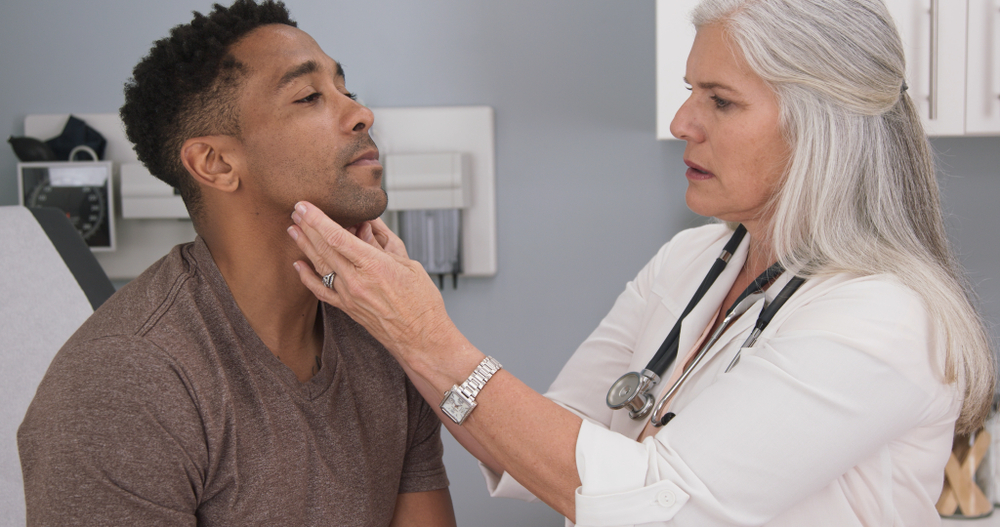You’ve found a lump and you’re not sure if it’s something innocent or if you should be worried - that’s human nature.
But the only way to free yourself from worry is to get it checked by a doctor. Before doing so, you may find it helpful to take a closer look at the lump and consider these questions:
- Is it soft to touch?
- Does it come and go?
- Does it move around?
- Is it getting smaller in size?
If you can answer ‘yes’ to any of these questions, then your neck lump is less likely to be anything serious. However, you should still get it checked by a doctor.
What’s the most likely cause of a neck lump?
A swollen lymph node (sometimes called a lymph gland) is the most common cause of a neck lump.
Lymph nodes are naturally present in your neck - you just can’t feel them most of the time. But if you’re fighting an infection, such as a cold, ear infection, tonsillitis or glandular fever, they can swell in size as your body fights the infection.
This is normal and the swelling should go down once the infection gets better. If the swelling doesn’t go down, you should get it checked by a doctor.

Other causes of a neck lump
A neck lump can be caused by many other things, including:
- a problem with your salivary gland - this may be an infection of the gland or salivary stones
- a problem with your thyroid gland - this could be the swelling of the gland (goitre) or a thyroid cyst
- a skin problem - this may be a skin tag, acne with boils, an abscess or a fluid-filled cyst
- a blood vessel - it’s possible for a blood vessel in the neck to become larger, causing a lump to form (aneurysm)
- abnormal development - a lump may be present at birth or develop later on
How to tell the cause of a neck lump
Location of the lump
The exact location of a neck lump can hold clues about its cause. For example, a lump caused by a swollen thyroid gland will usually appear on the front of the neck.
A lump on the side of the neck often suggests a swollen lymph node, which may be caused by an infection.
How the lump feels
How a lump feels can also say a lot about its cause. Lumps in or just below the skin may be due to a cyst - a fluid-filled lump that feels like a pea under the skin.
If the lump is hanging off the skin and looks like a wart, it may be a wart or a skin tag.
Should I get the lump checked by a doctor?
If you’re not sure if you should see a doctor about a neck lump, answer the following questions:
- Does the lump feel hard?
- Does the lump stay in the same place when you press it (some lumps move around)?
- Has the lump remained or got bigger over the course of a few weeks?
- Have you had the lump for more than 2 weeks?
If you’ve answered ‘yes’ to any of these questions, you should get the lump checked by a doctor.
It’s even more important to see a doctor about a lump if you’ve experienced any of the following symptoms:
- losing weight without trying to
- night sweats
- difficulty breathing
- feeling tired all the time
- difficulty swallowing and/or hoarseness
- unexplained bruises
- coughing up blood
A doctor may ask about your symptoms and look at the lump. If they’re not sure of what’s caused the lump, they may refer you for tests.

Is it cancer?
It’s natural to worry that a lump is a sign of cancer, but try not to worry. Remember that lumps can appear anywhere on your body - not just your neck - and usually they’re harmless.
If you’re particularly worried about a lump on your neck or the lump hasn’t gone away after 2 weeks, always get it checked by a doctor.
References:
Harding D. Neck Lumps and Bumps | Causes, Diagnosis and Treatment [Internet]. Patient.info. 2020 [cited 7 February 2020]. Available here.
Neck Lump - Ear, Nose, and Throat Disorders - MSD Manual Consumer Version [Internet]. MSD Manual Consumer Version. 2020 [cited 7 February 2020]. Available here.
Lumps [Internet]. nhs.uk. 2020 [cited 7 February 2020]. Available here.
Swollen glands [Internet]. nhs.uk. 2020 [cited 7 February 2020]. Available here.
Lumps and swellings - Your.MD [Internet]. Your.MD. 2020 [cited 7 February 2020]. Available here.
Skin tags - Your.MD [Internet]. Your.MD. 2020 [cited 9 March 2020]. Available here.






